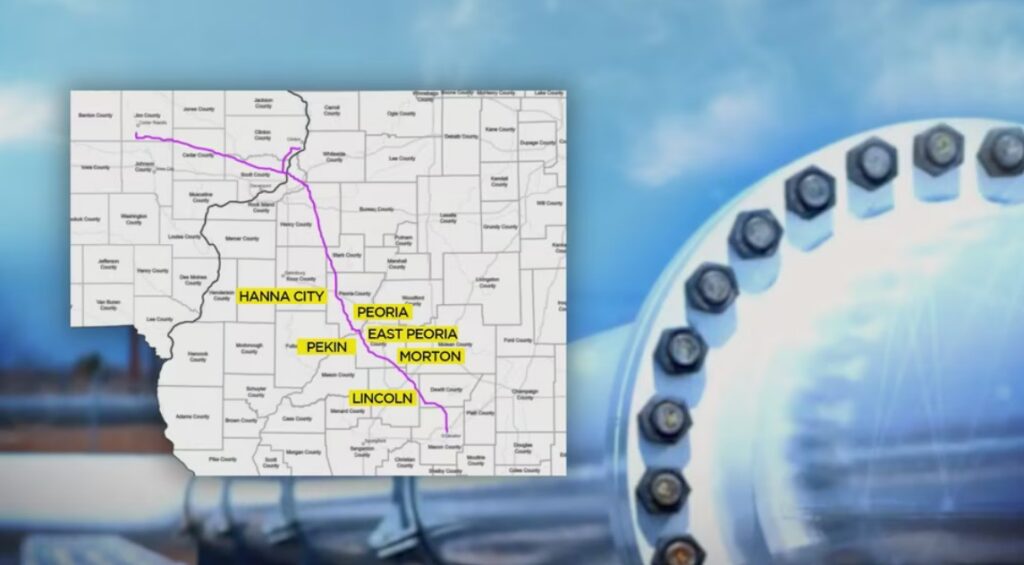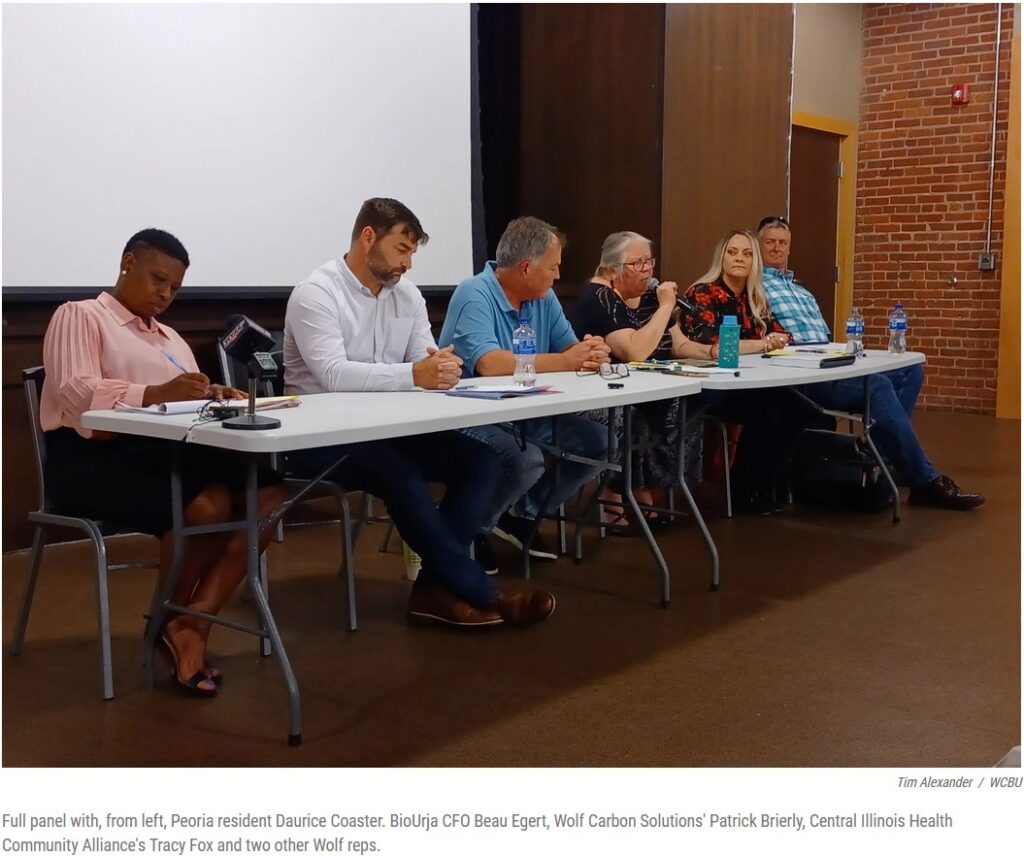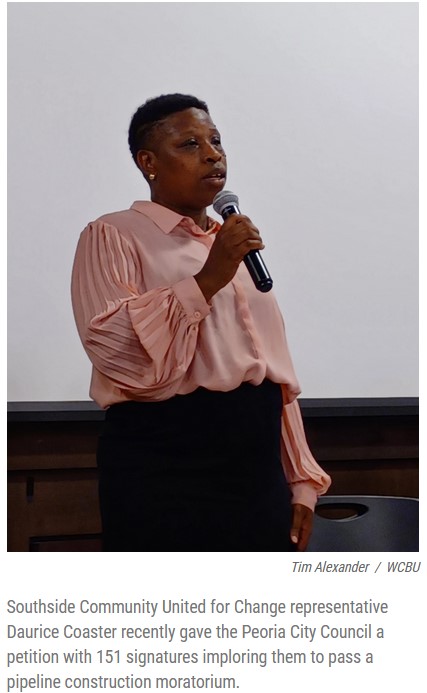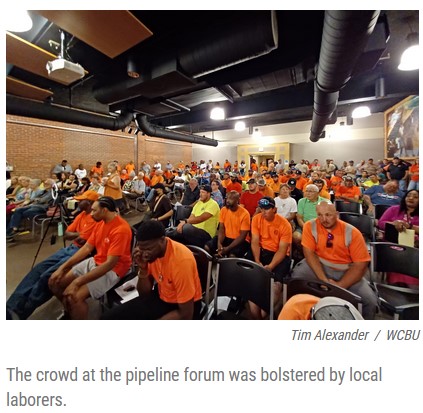 By B.N. Frank
By B.N. Frank
Americans opposed to carbon pipeline deployment include Democrats, Republicans and environmentalists (see 1, 2, 3, 4). Lawmakers are trying to regulate and/or block development as well (see 1, 2, 3, 4) which has led to companies trying to take land via eminent domain in several states. Opponents in Peoria, IL are requesting that developers at least wait until next year when new federal regulations go into effect before starting construction.
From WCBU:
Carbon pipeline stakeholders meet in largely civil exchange at Peoria’s Carver Center
WCBU | By Tim Alexander
A large number of Peoria’s south side residents feel an underground, high pressure CO2 (carbon dioxide) sequestration pipeline laid in proximity to some of Peoria’s oldest and poorest neighborhoods is a bad idea.
Many of them had a chance to meet with representatives of Wolf Carbon Solutions US LLC, the carbon capture company proposing the pipeline, and BioUrja Renewables, an energy and commodities group whose Peoria ethanol plant would serve as a collection point for carbon emissions, to clear the air.
The public forum, held at the George Washington Carver Center on Wednesday, was attended by around 200 individuals and stakeholders. The open meeting allowed those on both sides of the debate an opportunity to explain their positions and ask questions during a civil exchange that lasted nearly two hours.
Speaking on the topic were south side representative Daurice Coaster, Wolf Carbon Solutions vice president of engineering Patrick Brierly, BioUrja CFO Beau Egert and Tracy Fox, a representative of the Central Illinois Healthy Community Alliance. The forum was hosted by councilwoman Denise Jackson, who represents Peoria’s District 1.
Coaster opened the remarks by slowly counting to eight — the number of seconds she said it would take for a human to die from exposure to pressurized carbon in the event of a sudden pipeline rupture. The District 1 resident went on to say she could list at least eight reasons she stands against the proposed pipeline that would originate in Cedar Rapids, Iowa and terminate in Decatur, Illinois with a hub snaking through Peoria’s Southtown to a collection point located at the BioUrja ethanol plant.
“The south side of Peoria is a heavily populated area with approximately 14,000 residents and five schools,” said Coaster. “In order to pipe carbon that distance it would need to be liquified, and that’s part of the problem. When it is liquified, it becomes much more dangerous and volatile. There has never been a pipeline of this length and magnitude that (also) makes us guinea pigs.”
Coaster said the true motivation behind the proposed pipeline stems from the hundreds of millions of dollars in federal tax credits under the Inflation Reduction Act that could flow into the pockets of investors in Wolf Carbon Solutions, a private, Denver-based company backed by the Canada Pension Plan Investment Board. She also said she was approached by pipeline stakeholders with an offer to provide $5,000 for her personal non-profit endeavor, though she stopped short of characterizing the gesture as an attempted bribe.
“I would like to say publicly that BioUrja did offer me, personally, $5,000 for my nonprofit. When I asked them why they wanted to offer me this sum of money they said they wanted to invest in the community, because they care about the south side of Peoria,” Coaster said. “I’ll be more specific; the people at this table should be held responsible for how they have done business up to now.”
Coaster also expressed concern that there is currently not enough federal or state oversight to regulate carbon sequestration pipeline construction, allowing companies such as Wolf Carbon Solutions to operate in a largely unregulated business frontier. She pointed to a 2020 carbon pipeline breach near Satartia, Mississippi that affected hundreds of residents as strong evidence of the volatile and risky nature of high-pressure carbon pipelines.
Following Coaster’s remarks was BioUrja’s Egert, who didn’t deny the company had offered to donate to Coaster’s nonprofit.
“I support your nonprofit and we want to be a benefit to the communities that we are in,” said Egert. “We want to be a net benefit because if you look at our staff and the people who work at our plant, this is the community. We want to do things in the right way.”
In regards to safety, Egert noted that more than 5,000 miles of Co2 pipelines are currently in operation in the U.S., with a safety record that far eclipses other transportation options for stored carbon such as rail and vehicle. “[Co2 pipelines] are not new; they have been in operation for decades in rural and urban areas,” he said. “We can do this pipeline safely and in a way that is a net benefit.”
Brierly followed up by saying that Wolf Carbon Solutions has operated a 150 mile-long, 16-inch diameter carbon sequestration pipeline in Canada’s Alberta province for the past 3 1/2 years without incident. “Our design will mirror a lot of the components of that [pipeline],” said Brierly.
“When we designed the pipeline we took a lot of things into consideration. As for managing the quality of the Co2, we’ll have strict measurement and management of the impurities in Co2, because that’s how you minimize the corrosion inside the pipeline. We will model our emergency response plan and our safety training program after the one we have up in Canada, which is extensive,” he added.
In response to the Mississippi pipeline explosion, Breirly said the two pipeline models shouldn’t be compared.
“That was a completely different pipeline and a different set of circumstances than what you’ll see here in Illinois,” he said.
Fox said the Central Illinois Healthy Community Alliance stands against the pipeline development because “we are concerned about the safety, the sorry state of regulation, the cumulative risk and because of the challenges they pose to emergency response.”
She and others are calling for a moratorium on any new pipeline development in central Illinois until pending federal rules that regulate the carbon sequestration industry and pipeline development are put into place in 2024.
“The safe and the sane thing to do is to wait until the new pipeline regulations which are due in June of 2024 are published to do anything. I cannot help but be convinced that Wolf wants to get shovels in the ground before that because they don’t want to mess with the new or expensive or cumbersome pipeline regulations that are coming,” Fox said.
Not everyone attending the meeting stood against the pipeline.
A group of more than 50 orange-clad union workers with Laborers Local 231 helped pack the small Carver Center auditorium, prompted to attend as a show of solidarity for the project. During a wide-ranging Q&A session, Brierly said it will take up to 1,500 laborers to construct the pipeline and an additional 20 to 30 to maintain and service the infrastructure when completed.
Wolf Carbon Solutions is anticipating construction of the pipeline to begin by April 2025, according to Brierly.
We depend on your support to keep telling stories like this one. You – together with donors across the NPR Network – create a more informed public. Fact by fact, story by story. Please take a moment to donate now and fund the local news our community needs. Your support truly makes a difference.
Tim Alexander is a correspondent for WCBU. He joined the station in 2022.
Activist Post reports regularly about energy and unsafe technologies. For more information, visit our archives.
Top image: The proposed path for the Mt. Simon Hub Pipeline from Wolf Carbon Solutions (WEEK)/25 News
Become a Patron!
Or support us at SubscribeStar
Donate cryptocurrency HERE
Subscribe to Activist Post for truth, peace, and freedom news. Follow us on SoMee, Telegram, HIVE, Flote, Minds, MeWe, Twitter, Gab, and What Really Happened.
Provide, Protect and Profit from what’s coming! Get a free issue of Counter Markets today.




Be the first to comment on "Leaders, Organizations, Residents Oppose Carbon Pipeline Being Installed Near Poorest Neighborhoods, Citing Risks From “sorry state of regulation”"